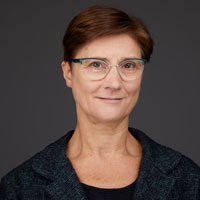Coach Training for Leaders and Educators in HealthCare (CFLinHC): Coming to the SEA in January 2024
Coach Training for Leaders and Educators in HealthCare (CFLinHC): Coming to the SEA in January 2024.
 Karen Souter, MBBS, FRCA, MACM |
Flying back to the West coast in March 2018 I noticed the man in the window seat gazing out of the window for a very long time. Eventually he turned to me and said, “what a day, huh?!” I smiled and nodded and asked, “what do you do?”. He said uneasily I’m the CEO of a company that builds automatic software for vehicles. I nodded again a little more knowingly – this week a bad accident had occurred involving a self-drive car. He asked me “what do you do?”. “I’m an executive coach” I said simply. He rolled his eyes and said rather loudly “Coaches, coaches, coaches. Everyone’s a coach these days!”. For a moment I thought about defending the honor of coaches and coaching leaders everywhere and then I decided to behave like a coach. “I know there are more of us around than there used to be... Are you headed home?”. He nodded.
“What are you heading into?
My team is freaked out” he said, quietly.
If this passage - taken from The Essential Coaching Leader (1) resonates with you, you most likely have the heart of a coach. Coaching is everywhere in medicine at the moment. Executive coaches work with c-suite healthcare leaders (2). Wellness coaching is helpful in mitigating burnout (3). The AMA is developing coaching models for medical student teaching (4). Many of you reading this may have worked with a coach on leadership or career development.
Why stop there?
We all know that medical school and residency barely equip us with the skills required to teach and lead in academic medicine. The SEA’s core mission is to teach anesthesiologists to become great educators, something we have been achieving with great gusto for over 30 years!
Where does coaching fit in?
When educators and leaders learn to coach, amazing things happen. A mentoring conversation is transformed into an exploration of what a mentee really wants for their career and how identifying their core values supports them to achieve excellence in meaningful ways. An emerging physician leader is empowered to take the theoretical knowledge learned on a leadership course and find ways to apply it in the VUCA (5) environment of operating room management. Their coach guides them to create real life experiments, to identify what works and why, and to take small courageous steps towards realizing their own style of leadership.
What are some of these coaching skills?
- Coaching Presence - the skill of noticing and deeply listening to what is right in front of you in the moment. The coach’s presence in the opening passage allowed her to notice the unease in the man’s voice, the changing tone of his words, his energy. Her presence shifted her way from “telling” about coaching, and towards creating a quiet space for reflection in advance of the storm awaiting him. An invitation to re-group, consider options and next steps. All of this condensed into the simple question “what are you heading into?”
- Co-creating a Level Three Conversation - includes deep listening and asking powerful questions. Level 3 listening arises from coaching presence and paying attention to more than just the spoken words. Level 3 listening informs the questions - short, open-ended questions intended to offer a deeper level of understanding. The process of transformational, sustained change can only occur when true meaning and understanding of a situation are present.
- Structured Emergence & Scaffolding. Coaching is forward facing, and action orientated. It is grounded in the behavioral sciences and change theories. Coaches know that talking about something doesn’t make it happen. The true power of coaching is in crafting real life experiments and brave, bite-sized actions that can be achieved and sustained; it is in identifying the support, structure and scaffolding needed for the person to go out into the world and make things happen.
This sounds good! How do I get some?
Coach Training for Leaders and Educators in Healthcare is a unique program that places emphasis on teaching coaching skills (including the ones described above) and the development of leaders and educators as agents for sustainable change and growth. We have adapted the program to suit the needs of SEA members and condensed it into 3, three-hour workshops and bi-weekly small group practice sessions all delivered virtually and facilitated by trained and credentialed coaches.
How do I find out more?
Follow this link to the SEA webpage. Reach out to Karen Souter MB, BS, PCC, MACM. ([email protected]).
Start a coaching conversation at SEA
We hope this article and the CFLinHC program will be the start of a conversation about coaching and how it can support anesthesiology educators within the SEA. We invite you to participate and collaborate! See you in January 2024!
References
- The Essential Coaching Leader - by PE Burgin, MA, MCC. Seattle Coach® 2019.Publish Your Purpose Press.
- Honaman JC. Coaching Emerging Healthcare Leaders. Health Exec. 2015; (5):62, 64-5.
- Askin WJ. Coaching for physicians: building more resilient doctors. Can Fam Physician. 2008;54 (10):1399-1400.
- AMA Academic Coaching in Medical Education
- VUCA (Volatility, Uncertainty, Complexity, Ambiguity)


